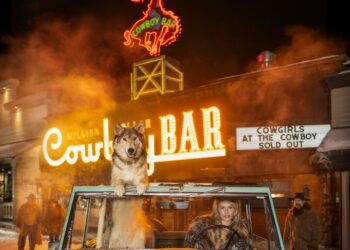Story and photos by Evi Dixon
For years, I was the master mower of
our 10 acres. Every time I rode our
lawnmower, salsa music blaring over
my headphones, I wondered what
animal could be more efficient. Sheep
pull the grass out by the roots. Horses
are too big. Cows destroy fences.
I was always fascinated by alpacas,
but knew that without help from
my husband Bob, I’d never be able to
build fences, pound post holes into the
ground or build a barn. Bob and I are ski
patrollers at Big Sky, and we weren’t
sure we had time to care for livestock.
After a couple of years of studying web
pages and other farms, I convinced him
alpacas would be the right co-workers
on our pastures.
In September 2010, the first five Suri
Alpacas moved in. Several more joined
them this May, and will produce two
crias (young) in September. Because
their gestation period is almost a year,
our herd is growing slowly.
The reason behind this operation was
not only yard work. As we grow older,
retirement in the years to come will
become a necessity. Another incentive
is the tax break gained by turning a
several acre private property into ranch
land. The income will come from a well
thought-out breeding program, fleece
production, compost selling and training,
handling, and shearing ours and
other people’s alpacas.
Alpacas originated in Peru, Bolivia and
Chile. They are a product of domestication
of two wild varieties of camelids
indigenous to South America. They
were domesticated before
the horse, dog or cat and
were owned by the Incan
royalty for their fine fleece.
Compared to Huacaya Alpacas,
Suri Alpacas like ours
only make up 10 percent of
the alpaca population in the
U.S. They have dreadlock-like
fleece with gorgeous
luster and shine that hangs
like a curtain.
Now I’m studying how
to handle the alpacas in a
nontraditional fashion. I
just returned from a clinic
in Oregon with Marty
McGee Bennett, founder
of “Camelidynamics –
handling Alpacas and Llamas with
respect.” Alpacas cannot be considered
pets and instead must be treated as light
livestock. They have to be weighed
once a month, might need injections or
de-worming medication. Taking alpacas
to shows is a good way to keep them
calm and safe.
It’s been fun and interesting to see the
different characters in these animals,
and to see even a scared and shy alpaca
turn into a more trusting and calm
individual.
Bob and Evi Dixon will be at the Big Sky
Country Fair on July 30, 2011 with two
of their animals. Come, see and visit!
Their farm is located near Manhattan on
Baker Creek. To contact them, visit their
website: sp-surialpacas.com or call Evi
at (406) 579-9694.














